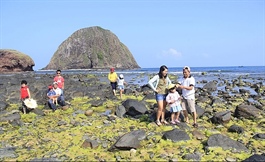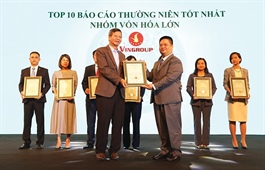Viet Nam to have 12 ecosystems with revenue of US$100 billion: McKinsey
Viet Nam to have 12 ecosystems with revenue of US$100 billion: McKinsey
Twelve large ecosystems will be established across retail and institutional services in Viet Nam by 2025, constituting a revenue pool of about VND2.4 trillion (US$100 billion). 
The information was released in a recently published economic research paper by McKinsey and Company. It points out how an ecosystem economy will transform Viet Nam’s economy in the years to come.
Ecosystem growth will be essentially driven by a significant decrease in the cost of customer acquisitions (CAC). Ecosystems enable automation on a large scale and integrate purchasing pathways, giving customers access to a variety of products and services within a single platform. This consolidation of channels has the potential to reduce CAC. For example, in the banking industry, ecosystems can generate (CAC) savings of 10 to 20 per cent.
Ecosystems enable companies to generate insights from a wide range of data and make the most out of it. Leading companies from multiple sectors to add new services to existing offerings, develop new business models, and even directly sell data-based products or utilities. For instance, companies with access to data will have greater visibility into customer preferences.
The report said one of the selling points of an ecosystem is that it fundamentally changes the way companies engage with customers and maintain competitiveness.
The trend is already happening. In 2019, three of the seven largest Vietnamese companies, Massan Group, Techcombank and VinGroup, established One Mount Group to create the country’s greatest ecosystem. Instead of competing in the already-crowded e-commerce space, One Mount Group’s newly formed venture, VinShop, captures value in the Business to Business to Consumer (B2B2C) market by addressing inefficiencies in the supply chain. VinShop offers thousands of traditional store owners a digital platform where they can order fast-moving consumer goods from suppliers and vendors. The ecosystem then benefits from its founding companies' pre-existing assets and diverse industry presence, potentially enabling it to scale faster than digital natives.
Telecommunications player, Viettel, meanwhile, has started to develop institutional ecosystems, serving public and private enterprises. With access to large-enterprise customers and in-house engineering talent, the company is seeking to acquire new customers with its core products: IT software and business solutions. At the same time, Viettel seeks to cross-sell new, currently noncore products such as security suites, cloud networks, and the Internet of Things. Various ventures into consumer-facing applications in payments, loyalty, and logistics could give Viettel an additional way to leverage its large consumer base to broaden the scope of its Business to Consumer (B2C) offerings.
According to McKinsey’s research, today, the combined size of Vietnamese ecosystems is about a hundredth of Chinese ecosystems ($50 billion in Viet Nam versus $4.9 trillion in China). Importantly, the landscape in Viet Nam remains fragmented, illustrated by more than 30 e-wallets already in the market, and yet it is still unclear who will emerge as the leading aggregator in the country.
Embracing ecosystems will require companies to adjust their business strategy. Six principles can aid executives in this transition.
First, companies need to widen their perspective of competitors and opportunities, adopting a truly multisectoral lens and defining the ecosystems and industries where change will be fastest. They should also identify critical new sources that bring the most meaningful value for an expanding consumer base.
In a borderless world, data serves as valuable currency. Competing effectively as an ecosystem means aggregating massive volumes of data and building capabilities to store, process, and analyse that data to generate actionable business insights. Companies can gain deeper data insights from ideas that sound good on the surface but often fall short of their potential to become winning models.
Today, winning customers’ loyalty through an emotional connection is the ultimate prize. Businesses are investing in tools to do so, such as data to customise their product and service offerings, content to engage customers, and digital models to support seamless customer journeys and address pain points. By building emotional connections with customers, companies can also occupy an attractive space in critical ecosystems.
In Viet Nam specifically, where top digital talent is in high demand, this means companies across industries will increasingly need to spend resources to recruit, onboard, and train these talents, while also ensuring they are placed in an environment where they can perform and deliver.
An ecosystem economy offers new opportunities for specialisation. To take advantage of them, companies need more and diverse partners. In a dozen markets across the globe - including Brazil, Russia, Turkey, and Viet Nam, where data sets are currently less robust compared with those of other regions - a new wave of partnerships is aiming to make the whole greater than the sum of its parts. Any business leader in Viet Nam will soon need to define their ecosystem strategy, understand how their industry is getting disrupted, and make a choice. They can defend the business as is, modernise and digitise it, partner with others to develop the same competitive advantage as an ecosystem, or join (or even build) an ecosystem.



























